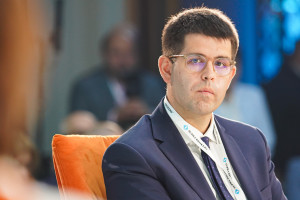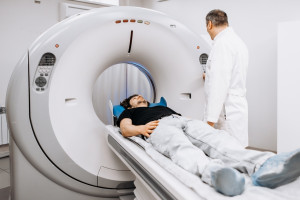One of the most common cancers in Poland. Last days to take a test to detect it in the 40+ program

- During the meeting of the Parliamentary Team for Cancer Prevention – RAK STOP, experts discussed the challenges in the diagnosis and treatment of colon cancer.
- As they said, each year over 18 thousand new cases of this cancer are diagnosed in Poland, and the annual number of deaths due to it is approaching 12 thousand.
- Doctors do not know where to refer patients for the FIT test (a screening test for colon cancer that detects occult blood in stool, invisible to the naked eye), because its availability in the 40+ package ends at the end of April. - What next - is unknown - indicated prof. Jarosław Kobiela
- The number of cases in people under 50 is growing, which poses a new challenge for the system. We are facing a change in the age limit for colonoscopy screening from 50 to 45 years - he added
- Colorectal cancer is the second most common cancer in Poland - every year over 18 thousand people hear this diagnosis, and the number of deaths due to this reason is approaching 12 thousand - said Prof. Jarosław Kobiela , Head of the Department and Clinic of Oncological, Transplantation and General Surgery at the Medical University of Gdańsk during the meeting of the Parliamentary Team for Cancer Prevention - RAK STOP.
He reminded that diagnostics are based on colonoscopy, tests for occult blood in the stool – FIT test and imaging tests. Prevention, in turn, consists of a healthy lifestyle: not smoking cigarettes, not drinking alcohol, maintaining a healthy body weight, a healthy diet, physical activity and screening tests.
As he noted, in recent years there has been an increase in the number of cases among people under 50 years of age.
- Young patients pose a new challenge to the system, because we are talking about people who will probably return to work and their social roles after treatment, and they probably also have procreation plans, which must be taken into account in this age group. The US has already noticed this and changed the age limit for colonoscopy screening from 50 to 45. In the near future, such a change awaits us as well - the expert noted.
"The results of treatment in individual hospitals must be published"- What challenges do we currently face? First of all, in Poland we do not have a coordinated screening programme. We do not know for sure whether we are switching to the FIT test and only in the case of a specific result will a colonoscopy be performed. As a doctor, I do not know where to refer patients, because the availability of the FIT test in the 40+ package ends at the end of April. What next? – asked Prof. Kobiela.
As he said, the second challenge is centers of excellence – high volume and high quality centers that treat a large number of colorectal cancer cases and can demonstrate good treatment outcomes.
- Treatment results should be published and available to patients so that they can obtain information on the National Health Fund website or hospital websites about, among other things, survival, the number of complications, or mortality in a given facility. Such data will influence their decision to choose the hospital where they want to be treated. This will naturally eliminate from the game centers that operate, for example, 4 cases of colon cancer per year. Publication of treatment results should be forced from above - the professor argued.
He emphasized that it is important to centralize the treatment of this cancer in centers of excellence. Coordination is also needed through the actions of oncological care coordinators, who accompany the patient throughout the diagnostic and treatment path. Attention should also be paid to the importance of prehabilitation and daily rehabilitation after the procedure, which speeds up the patient's return to normal functioning and brings large savings to the health care system.
- Care in the form of social support after discharge from hospital is also necessary, because it is very often lacking. It could be provided by MOPS employees, in agreement with the coordinator, and it would probably be a good way to prevent deaths occurring in the perioperative period, i.e. within 30 days after discharge from hospital - said Prof. Kobiela.
"The great hope is endoscopic surgery"As he noted, when it comes to surgery, the "tipping point" right now is robotic surgery.
- I have some doubts, however, because we are talking about very expensive equipment, which is indeed very helpful in colon cancer, but is not a "game changer" . However, it is prehabilitation - appropriate preparation of the patient for the surgery through the work of a physiotherapist and supplementation of nutritional deficiencies. Both will help the patient go through the procedure with the least possible damage to health - assessed the professor.
- I believe that robotic surgery should of course develop, but in centers of excellence that treat a large number of cases - he added.
He pointed out that endoscopic surgery is a great hope, especially if a good screening program were in place and more cancers were detected at an early stage. They could be removed without the need for open, robotic or laparoscopic surgery, with great benefit to both patients and the system. Hospitalization would then not last longer than 1-2 days.
- Another important goal that we should strive for seems to be the establishment of cancer prevention centers at university hospitals . An example of such a center is the one operating at the National Institute of Oncology in Warsaw. Launching these units would enable more coordinated planning of preventive measures, not only in the case of colon cancer - added Prof. Kobiela.
Copyrighted material - reprint rules are specified in the regulations .
rynekzdrowia












